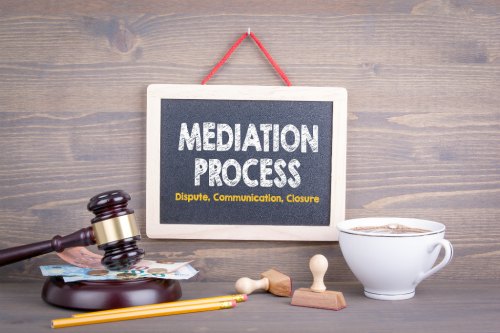Is Mediation a Good Way to Save Money on a Divorce?
(This page may contain affiliate links and we may earn fees from qualifying purchases at no additional cost to you. See our Disclosure for more info.)
Your relationship is ending. On top of the stress, emotions, and decisions involved in going your separate ways, worrying about money is keeping you up at night.
You know you need to protect yourself and your financial future but paying a lawyer thousands of dollars really concerns you too. You'll both end up broke if the divorce is dragged through the court system for months – or years.
Divorce mediation could save you considerable stress, time, and money during the divorcing process. It's an option worth considering for both spouses. But keep in mind, mediation isn't a substitute for seeking the advice of a qualified attorney, and using a lawyer for divorce makes better sense for some.
Let's take a more in-depth look at mediation, how it saves money, and how it can help you when obtaining a divorce.

What is Divorce Mediation?
According to Leah Villalobos, a Certified Financial Divorce Financial Analyst (CDFA), divorce mediation is a “voluntary, confidential process by which a trained divorce mediator facilitates conversations with the parties involved.”
As a solution-focused process, mediation can be faster and much less expensive than traditional divorce litigation. Mediation allows divorcing individuals to have more control in a challenging and stressful situation.
Another bonus? Since mediators receive training in conflict resolution, they can even help build communication skills between divorcing parties. This may be very important if the couple has children or if on-going communication is necessary following the divorce.
Mediators can provide legal information to the couple, but they cannot give legal advice – even if the mediator is a lawyer.
People with more complex legal or property situations often consult a divorce lawyer before mediation to discuss the legal consequences of possible settlement terms. They may also ask for the attorney's approval to be one of the conditions of a mediation agreement.
How Does Mediation Work?
After spouses agree to mediation and choose someone to work with, they start the mediation process.
Attorney Emily Doskow describes five basic stages of mediation. She explains some people move quickly and may even skip stages, while others may have to revisit stages throughout the mediation process.
- Introduction stage – The foundation of the mediation process is laid out. The mediator observes the communication style of the couple and the issues needing to be dealt with in mediation. They then create a framework for moving the process forward.
- Information-gathering stage – This step can take a long time because it requires all of the critical information (legal, financial, property, etc.) to be available for review. If information is missing, framing and negotiating may need repeating which can slow down the process and add to the overall cost.
- Framing stage – Each spouse determines their most important goals or interests in each issue that needs to be decided. Sometimes mediators meet with each spouse individually, and others choose to keep divorcing parties together during this stage.
- Negotiating stage – Each of the parties interests are shared and options to address the interests determined. Discussion of tradeoffs occur, and a narrowing of choices ensue as negotiations continue.
- Concluding stage – A tentative settlement is reached, and the mediator gives each person a copy for review. The divorcing spouses can then have the agreement reviewed by any outside parties advising them.
Keep in mind if either party decides they do not wish to continue with mediation, the process will end. The mediator can also terminate mediation if either one (or both) of the spouses are not effective or participating in the process.
If the mediation is successful, court appearances by the divorcing parties are not usually necessary.
When the mediator is an attorney, they can usually file all the necessary paperwork with the courts. If a mediator isn't a lawyer, they typically know attorneys who will complete the paperwork for reasonable fees.

The Cost of Divorce Mediation
It's no surprise the cost of mediation can vary widely. Some community-based agencies may have a sliding scale or even free negotiations available to those who qualify.
Mediators may charge a flat-fee based on the complexity of the situation. Villalobos runs Greater Lakes Divorce Financial Solutions and charges $2,000 – $7,000 – depending on the circumstances surrounding the mediation.
Some private mediators charge between $100 and $1000 per hour. Luckily, the average mediation is on the lower end and ranges from $100- $300 per hour. Mediators may also charge for the preparation of settlement paperwork and court documents.
While it may sound like a lot of money, consider the costs of paying a divorce lawyer for their time reviewing and preparing your case. Then, add in all the additional work and fees associated with the cost of a trial.
If you're going through a divorce, take a look at your specific situation and what issues may arise. Contact attorneys and mediators about their fees to assess whether using mediation could make sense for you.
Who Should Consider Mediation?
If both spouses accept divorcing, mediation is could be a logical step in ending the legal relationship. A willingness to agree on working together and being transparent with all financial, legal, and personal property information supports mediation.
General agreement on custody issues for any involved children is also essential. While the mediator can work through many problems with divorcing partners, custody battles usually end up requiring divorce lawyers.
Don't think you have to be “friendly” with your soon-to-be-ex to use mediation.
You might use virtual mediation if you don't want to be in the same room with your spouse. Just remember you and your spouse need to agree to be willing to discuss what is reasonable and negotiate in good faith for a successful mediation. Both of you have interests requiring attention.
When Hiring a Divorce Lawyer Makes Sense
While mediation usually saves time and money, it isn't right for every divorcing couple.
Since mediation is a collaborative process – if one spouse refuses to consider mediation, you will have to use a divorce lawyer. Although some spouses may be forced to go through mediation if ordered by the court.
Mediators usually won't take cases where either spouse has been the victim of domestic violence or any other type of abuse. Courts often waive mandated mediation in these situations too. Divorce lawyers are needed to handle these and other contested cases.
If you struggle to advocate for yourself, you might need a lawyer instead of a mediator.
And if you have any indication your spouse is hiding money or other assets, taking property, or making any threats against you, your children, or your financial future – you probably need a divorce lawyer to protect your rights.
Will Mediation Save You Money In a Divorce?
If you choose mediation, you'll experience a confidential process facilitated by a trained professional. It will likely save you stress, time, and money. It's important to note mediation can be incredibly valuable to those in the “gray divorce” group nearing or at retirement age.
Mediation is an option most divorcing spouses should at least consider. But keep in mind, mediation isn't a substitute for seeking the advice of a qualified attorney.
The specifics of your situation should drive the decision on how to move forward in your divorce. It will be a costly process – emotionally and financially – no matter what route you take.

Written by Women Who Money Cofounders Vicki Cook and Amy Blacklock.
Amy and Vicki are the coauthors of Estate Planning 101, From Avoiding Probate and Assessing Assets to Establishing Directives and Understanding Taxes, Your Essential Primer to Estate Planning, from Adams Media.
